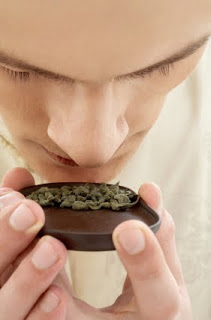Recently, I received the following question on my Facebook page:
Lauren, have any of your patients asked you about Sensa? Don’t get mad at me for asking… 🙂
I’m happy to answer questions about anything food or weight-related no matter how far-fetched. What’s interesting is that in this question you can see my “friend” had suspicions about this product…but still wanted to know more. If you’re unfamiliar with Sensa, it’s a scent-based weight-loss product made of natural and artificial ingredients that comes in a salt-like shaker and resembles powdered sugar. You sprinkle Sensa onto your food prior to consuming it in the same way you would sprinkle salt or pepper. The shaker has two sides; a sweet side to be used on sweet foods and a salt side to be used on savory foods. This shaking isn’t cheap, the Sensa program is suggested for 6 months; a 6 month supply costs $235.
Sensa was developed by Dr. Alan Hirsch, a board certified neurologist and a psychiatrist, who specializes in research of sensory response. The idea is that Sensa enhances the smell and taste of food, which suppresses hunger. Dr. Hirsch calls this “sensory specific satiety.” Whether or not Sensa suppresses hunger, the connection between flavor and satiety is interesting. On one hand I think of artificial sweeteners, which enhance the sweetness of food and increase caloric intake. Then there is the notion that spicy foods, with intense flavors, increase satiety as you are satisfied by the flavor and eat less. Intrigued, I had a look at the research.
Dr. Hirsch says he has proof of the effectiveness as he conducted a 6 month study in which 1,500 participants lost an average of 30.5 pounds during the 6 months. The problem is, he never published the study. It’s difficult to agree with the results of a study that is not in a peer reviewed journal. Another important thing to note about his study is that the participants weighed themselves and reported their weight without being checked by his team. The show 20/20 contacted 4 people that were said to be participants of the study and although they all claimed to have lost weight during the 6 months, none of them had been able to keep the weight off. I read a bunch of testimonials on various websites and some people swear by Sensa while others say they haven’t lost an ounce and that it’s a waste of money. This makes me think that aside from the fact that the jury is still out (or hung) on Sensa, our response to scent and its relationship to hunger may vary from person to person as do food preferences and food-related memories.
I would love to see Dr Hirsh publish his studies or have aromatherapy and weight loss studied more. Scent is our most primitive sense. Scent has been shown to trigger memories. Certain scents such as mint and eucalyptus are energy boosting. Others, like lavender are relaxing. I use Origins lavender oil nightly on my wrists and swear by it. In terms of appetite, there are 2 scents that repeatedly. One was vanilla, the scent of vanilla is said to decrease sweet cravings. The other is patchouli, patchouli is said to decrease appetite. Maybe that’s why lots of hippy chicks are skinny, it may not be the concert dancing after all. I would save your money and skip Sensa for now. I don’t think it’s dangerous but I’m not convinced it’s effective either. In the mean time, sniff some patchouli oil (or its relative the under arm) and let me know how your appetite is.
What do you think of Sense? Sensible or scam? How do you decide whether to invest in a weight loss product or supplement? And are there certain scents that you feel increase or decrease your appetite?



I'm always wary of any weight loss or diet plan that sounds too good to be true. Whatever happened to losing weight by crowding out with whole foods?
HI Lauren! This is EXACTLY the kind of post I wanted to read. I kept seeing infomercials about Sensa, but they never explain how it works. As someone who has completely cut out even putting one Splenda in my coffee because it is just so fake, I think I'll take a pass on this and stick to my hour work out daily and mostly veggies and lean protein regimen for now. Thanks so much for writing about this–I always look to you for the nutri-updates. 🙂
PS: have you written a post re: alcohol yet? If you have, I think I missed it. I have been really trying to cut calories and I know that alcohol is a biggie. BUT I do like a cocktail or a glass of wine MORE than every now and then. I know that you do, too. Can you tell us how you fit your fun in to your daily diet? Thanks!
Oh, if only it was this easy. All I can visualize are people snorting this like crack.
I'm a diet book junkie but I don't buy supplements. I'm too scared of fat burners and the like.
Why not just sniff the sense before and during eating? Wouldn't it have the same effect and you could save tons of money?